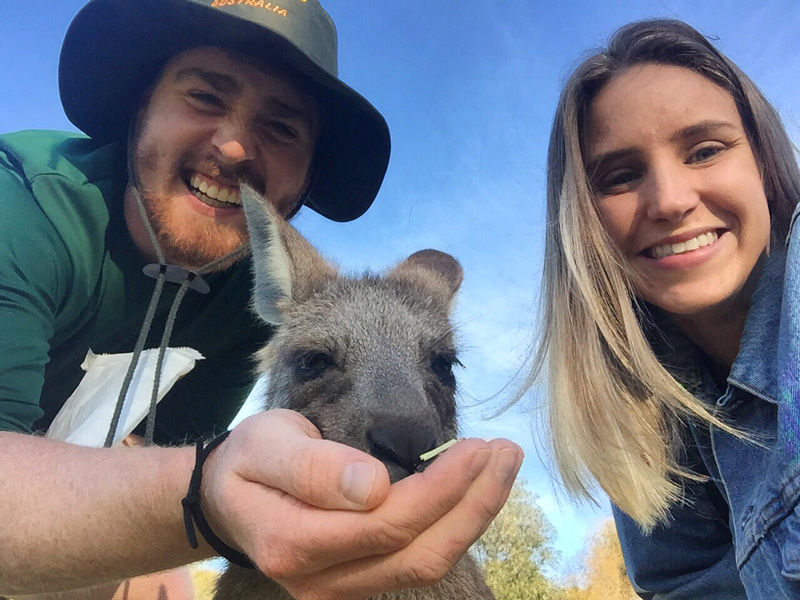


Study abroad program gives student more than an education
Studying abroad gives students more than just the chance to see the world; it also provides opportunities home can’t offer. For senior biology major Thomas Gillan of Lincoln, Nebraska in the US, this included celebrating New Year’s on a beach, learning how to surf and checking out koalas in Wollongong, Australia.
The Lincoln native had never left the city for this long before, but Gillan made the decision to attend the University of Wollongong in New South Wales after meeting Australian international students at UNL.
“I fell in love with the attitude and always wanted to leave Lincoln,” he said.
Gillan had to find an apartment and a job with only a few contacts in the country. While he was able to find a place to live using the internet, getting work as a foreigner was trickier. “I had to make a few friends first,” Gillan said.
He eventually befriended the manager of a pub, who offered him a job. Unlike at most restaurants in America, tipping is not a custom in Australia, meaning Gillan’s income consisted entirely of his set paycheck. Gillan discovered the logistics of school in Australia also differed from that in the United States.
Not only was the time different in Australia, with Wollongong 15 hours ahead of Lincoln’s time zone, but the seasons themselves had changed when Gillan landed.
Since Australia is in the Southern Hemisphere, its winter takes place during the U.S.’ summer, and vice versa. The first school term goes from February to late June, and the second term goes from late July to November. But Gillan said these changes didn’t bother him.
“It’s more an accumulation of small things,” Gillan said. One of those smaller things was the plants and animals he studied while taking biology classes at the university.
Instead of dissecting frogs and pigs like in American classrooms, Gillan was exposed to the Australian alternatives.“As a biology student, I got to dissect a koala, a kangaroo and a wombat,” Gillan said. “That was pretty cool.” The koala, by far, was the most strange animal Gillan worked with. He had previously only seen the animal in pictures, so it was interesting to see one in real life, even if the animal was dead. The class was only allowed to dissect roadkill because the koala is endangered and roadkill is pretty common in the country, Gillan said.
But the animal’s insides didn’t contain anything Gillan hadn’t seen before.“Once you get in there, it’s pretty much the same as any other mammal,” Gillan said. Gillan also examined multiple plants in one of his other biology classes, which led to an unfortunate mishap of accidently collecting an endangered plant.
“You are only meant to collect certain plants, and I didn’t know any of the plants, so I just picked up this flower one day at the beach because it looked cool,” Gillan said. “And lo and behold, it’s an endangered species.”
The culture of higher education in Australia is also different than in the U.S.. While many students who go to college in the U.S. have all sorts of motivations and reasons to go, in Australia, the students primarily go for one purpose:“People there go to university because they want to continue their education and be students rather than get the college experience,” Gillan said. “Everyone in every one of my classes was a student first, and that was their primary focus.
This led to harder classes and more expectant professors, according to Gillan. Even with these higher standards, Gillan saw that most of the students were more laid-back than their American counterparts. He didn’t see the same stress levels he sees in college students in the United States. Attending classes was not Gillan’s only reasons for going halfway across the world; he wanted to take advantage of the unique cultural experience. He says he really enjoyed spending his days on the beach, which was right by where he was living. He hiked a lot on his free days, which led to a frightening experience in the country, which has a reputation for dangerous animals.
“One day, we were out bushwalking in Byron Bay, and I actually came across a red-bellied black snake on the path,” Gillan said.
While the snake doesn’t distribute enough venom to make its bites life-threatening, they’re still very dangerous, and a bite from one requires serious medical attention. And Gillan was within arm’s reach of one.“I just stopped,” Gillan said. “It was three feet away from me.” The group turned back on the trail and left unhurt, but Gillan said the experience was by far his scariest moment on the trip.
That moment was a memorable one in a trip that included trying to learn how to surf and visiting all of Sydney’s famous tourist attractions. But one part of the trip stood out for Gillan. He celebrated New Year’s on the beach at Byron Bay, his first time celebrating the holiday outside of Nebraska. Gillan was hanging out on the beach at midnight, with fireworks going off in all different directions. Combined
with the large crowd, it was an experience he could never forget.
“Everybody’s just sitting on the beach getting their New Year’s kiss in,” Gillan said. “It was awesome. ”While school was important to Gillan during his stay in the country, what he really cherished were the once-in-a-lifetime experiences he had not in a classroom setting. From staying at an Australian cattle ranch to just hanging out on the beach every day, Gillan used his time in Australia to live life to the fullest.
“I learned more outside of school there than I did inside,” Gillan said
See this story about Nebraska and lots more here: http://www.dailynebraskan.com/